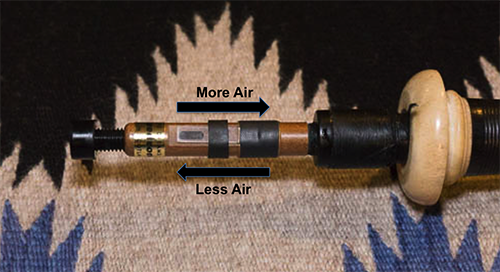In the last of the “4 Questions” of bagpipe maintenance, we will be focused on maximizing the efficiency of our drone reeds. Think for a moment – what does “maximizing the efficiency” of a drone reed mean?
It means…
Each drone reed takes the minimum amount of air possible while we’re playing our instrument.
How can we control how much air our reed takes?
Opening and Closing a Drone Reed
Just like a camera can open and close its aperture to allow for more or less light to get in, drone reeds can open and close to let more or less air through.
This is essential for the proper (and physically possible) operation of the bagpipe, because, as we discussed earlier, unless our reeds are taking the minimum amount of air necessary, our bagpipes will be more difficult to blow than necessary.
A bagpipe that is needlessly difficult to blow will cause:
- decreased stamina,
- inability to focus on playing good music,
- difficulty tuning due to bagpipe instability,
- difficult tuning due to excess moisture accumulation,
- drones that are too loud,
- etc.
Let’s look at how to adjust a reed’s “aperture.” Even as a beginner, you have to become confident with this type of adjustment, and willing to do slight adjustments on a daily basis.
Adjusting the “Open-ness” of Your Drone Reeds
To open a drone reed, we can (very slightly) move the adjustment bridle “up,” towards the base of the reed (where the air goes out).
To close a drone reed, we can move the bridle “down,” towards the end of the reed (where the air goes in).

It’s that simple!
Testing Your Drone Reed’s “Open-ness”
To test a reed’s aperture or “open-ness,” we can mouth blow the reed to observe how it functions. When mouth-blowing, make sure to mind the following important details:
- Your lips seal above the anchor bridle of the reed so that you don’t interfere with the tongue of the reed as it vibrates
- You don’t mouth-blow so much that moisture accumulates on the reed. Moisture on the reed will negatively impact how the drone reed functions.
Go ahead and mouth-blow a tenor reed.
If a reed is too closed, you’ll know because it literally stops! The tongue gets jammed because there’s too much air, and it quite literally pops off.
If a reed is too open, however, it can be tough to tell. That’s why we have to test to ensure our reeds are calibrated each time we play….
Very Basic Calibration of 1 Drone Reed
The most basic (but perhaps most important) calibration test a piper uses is simple:
If we blow too hard on our drone reed, it should… shut off.
Yes, it really is that simple in concept. If the reed shuts off when we blow too hard on it, that means it’s not wildly too open, causing us to waste tons of air. (If we blew really hard and it stayed working, that means it’s “sucking” way more air out of our bagpipe than necessary.)
Drone Reed Calibration Exercise:
Now it’s your turn!
- Mouth-blow your reed. Get the reed to the point where it sounds normal.
- Now, increase the pressure significantly.
- Does the reed shut off?
- If it doesn’t shut off, close the reed slightly (by moving the bridle down)
- If it shuts off at too “easy” a pressure, we can open it up slightly.
Once you have the reed the way you like it mouth-blown, put the reed in the pipes and do the same test again with the reed operating as part of the whole instrument. Make tweaks if you think it’s necessary.

0 comments